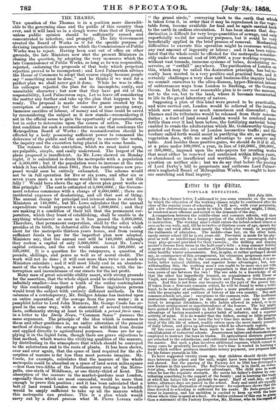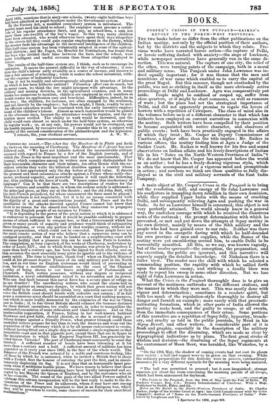rtirr to flit etitur.
POPULAR EDUCATION.
15th July 1858. Sin—In a former letter, I addressed to you some remarks on the means by which the education of the working classes might be continued after the close of the regular years of schooling. I will now, with your permission, add a few observations on a mode in which that education might, I think; be rendered more efficient and suited to the demands of the day. A comparison between the middle-class and common schools, will show that the latter provide for a larger portion of the child's life being devoted to instruction. The working man's child enters the infant-school almost as soon as he can walk, and, till he is twelve or thirteen years of age, spends day after day and week after week nearly the whole year round, in acquiring the rudiments of education. The middle-class boy, on the other hand, rarely enters school till he is six years old. Provision is made for his phy- sical as well as intellectual training : manly sports are encouraged, and a large play-ground provided for their exercise ; the drilling and dancing master's lessons form items in the half-year's bills : a long summer holiday is spent at the sea-side ; and another at Christmas is devoted to skating and other healthy winter amusements. But, in spite, or rather perhaps I should say, in consequence of this arrangement, his education progresses mere sa- tisfactorily than the boy in the common school. He has indeed, it is pro- bable, better natural abilities, and superior home advantages ; but, not- withstanding this, the working man's son ought to be more on a par with his wealthier compeer. What a poor comparison is that at twelve or thir- teen years of age between the two ! The one adds to a knowledge of all that the other has imperfectly learned, an acquaintance with Ccesar or Virgil, and some knowledge of the Greek and French, or German gram- mars. And this is not from any incapacity on the part of the poorer boy. If taken from a first-rate common school, he will be found to write a better hand, to be readier at arithmetic, and have a more practical acquaintance with the geography and outlines of history of his own country. But such common schools are, alas exceptions to the common rule. The inefficient instruction ordinarily given in the national school can only be attri- buted to irregular attendance, to idle habits allowed in school, or to an inefficient arrangement or superintendence of the lessons. The boy might have gained all his knowledge in half the time, and with the additional advantage of having acquired a greater habit of industry, and a superior activity of mind. It is no wonder that the father, seeing so little progress
i
made, should be anxious to turn the boy's time into money. He himself, tired of the idle life of school, readily enters upon the more manly pursuits of daily labour, and gives up advantages which he afterwards regrets. Of late years an effort has been made to meet these difficulties by the establishment of industrial schools. Journeymen tailors and shoemakers are employed to instruct the boys in trades. In agricultural dietrictsgardens are attached to the schoolhouse, and cultivated under the superintendenc. of the master. But such a plan involves additional expense, which cannot in many cases be prudently incurred; the boy's time is wasted in learning Et trade which neither produces immediate money payment, nor prepares hiel for his future pursuits in life. To have suggested twenty years ago, that children should divide their days between the school and the mill, might have been deemed visional' and absurd. But the passing of the Factory Act in 1844 has developed a new feature in this question. The Aalf-time system, is in itself, an induo trial plan, which presents superior advantages. The child goes to work when he has the requisite strength. He meets his father's desires by con- tributing something to the support of the family : and is learning the trade at which his future life will probably be spent. Half of each day, or still better, alternate days are passed in the school. Body and mind are equally developed by this alternation of employment : for experience shows that the time devoted to schooling is sufficient for his needs. He feels greater in- tenet in learning, and his ambition is excited to keep up with the boys whose whole time is spent at school. No better evidence of this can be given than a statement of the Factory Inspector, Mr. Horner, who in his report of
April 1851, mention's that in sixty-one schools, twenty-eight half-time boys had been admitted as pupil-teachers under the Government system. By the Factory Act, a modified compulsory system is introduced. The parent runt send his child to school; the employer must procure a certifi- cate of his regular attendance there, and pay, as school-fees, a sum not more than one-twelfth of the boy's wages. hi this way, many children have been educated, who would otherwise have spent their days altogether in the streets till they could gam regular employment in the factory, while the master finds his advantage in the increased intelligence of the children. Tbia half-time system has been voluntarily adopted in some of the agricul- tural districts; and Mr. Paget, the Member for Nottingham, has found that the boys who divided their time between the farm and the school, were more intelligent and useful servants than those altogether employed in labour.
The results of the half-time system are, I think, such as to encourage its extension. It meets the present difficulty in the way of education ; it ren- ders the child's labour early available as a source of income, and insures to him a fair amount of schooling ; while it makes the school industrial, with- out the expense of industrial teachers. Can it not be readily and advantageously adopted in branches of labour in which it has been hitherto untried ? Voluntary effort can do much, but in many cases, we think the law might interpose with advantage. In the colliery and mining districts, in the agricultural counties, and in many trades too numerous to mention, children are employed in such numbers as would render its application easy and beneficial. Difficulties, indeed, lie in the way ; the children, for instance, are often engaged by the workmen, and not directly by the employer ; but these might, I think, readily be met. An efficient education would be combined with the early lucrative employ- ment of the children's labour. Almost as much instruction would be gained in the alternate days, because the attendance would be regular, and the at- tention more excited. The ability to work would be increased, and the child would earn almost as much under the half-time system, as otherwise by regular work ; or, at any rate, his powers would not be overtaxed, and his health injured, by excessive labour. I consider this to be a subject well worthy of the earnest consideration of the philanthropist and the legislator. I remain, Sir, your obedient servant, A. W. W.



























 Previous page
Previous page